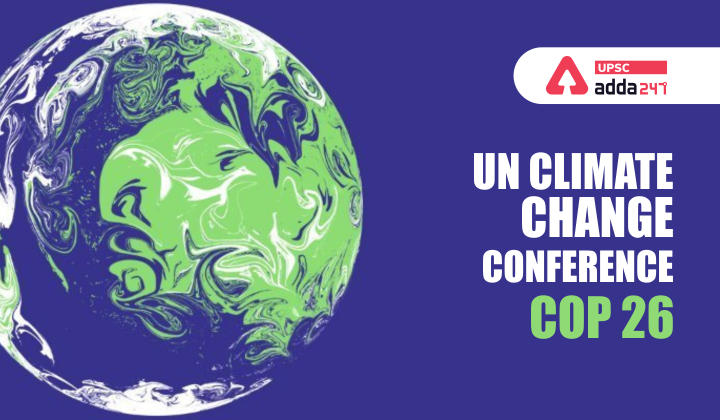Table of Contents
UN Glasgow Climate Change Conference- Relevance for UPSC Exam
- GS Paper 2: International Relations– Important International institutions, agencies and fora- their structure, mandate.
- GS Paper 3: Environment- Conservation, environmental pollution and degradation.
Road Accidents in India – NCRB Report 2020
UN Glasgow Climate Change Conference- Context
- Recently, United Nations Secretary-General warned that “unless we collectively change course, there is a high risk of failure” at the much-anticipated U.N. Climate Change Conference of 2021.
- Due to COVID-19, the 26th session of the Conference of the Parties (COP 26) to the UNFCCC was postponed in 2020 and will take place in Glasgow, Scotland in November 2021.
Get free video for UPSC CSE preparation and make your dream of becoming an IAS/IPS/IRS a reality
UN Glasgow Climate Change Conference- Key Points
- About: The COP 26 UN Climate Change Conference will be hosted by the UK in partnership with Italy from 31 October to 12 November 2021 in the Scottish Event Campus (SEC) in Glasgow, UK.
- Participation: More than 190 world leaders will participate, along with tens of thousands of negotiators, government representatives, businesses and citizens for twelve days of talks.
- Key Objective: The summit will bring parties together to accelerate action towards the goals of the Paris Agreement and the UN Framework Convention on Climate Change.
Goods and Services Tax (GST) Council
United Nations Framework Convention on Climate Change (UNFCCC)- Key Points
- Background: UNFCC was signed in 1992 as a result of the United Nations Conference on Environment and Development.
- United Nations Conference on Environment and Development is also known by other names like the Earth Summit, the Rio Summit, or the Rio Conference.
- Two other outcomes of the Rio Conference were Convention on Biological Diversity and the land United Nations Convention to Combat Desertification.
- About UNFCCC: it is a multilateral treaty governing actions to combat climate change through adaptation and mitigation efforts directed at control of emission of Green House Gases (GHGs) that cause global warming.
- It is considered the parent treaty of both the Kyoto Protocol (1997) and the Paris Agreement (2015).
- UNFCC entered into force on 21st March 1994 and has been ratified by 197 countries.
- India ratified the UNFCCC in 1993.
- Nodal Agency in India: Ministry of Environment, Forests and Climate Change (MoEFCC) acts as the nodal agency for UNFCC in India.




 TSPSC Group 1 Question Paper 2024, Downl...
TSPSC Group 1 Question Paper 2024, Downl...
 TSPSC Group 1 Answer key 2024 Out, Downl...
TSPSC Group 1 Answer key 2024 Out, Downl...
 UPSC Prelims 2024 Question Paper, Downlo...
UPSC Prelims 2024 Question Paper, Downlo...




